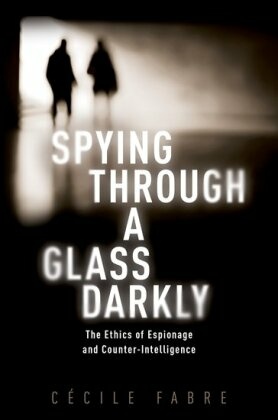
Spying Through a Glass Darkly - The Ethics of Espionage and Counter-Intelligence
| Verlag | Oxford University Press |
| Auflage | 2022 |
| Seiten | 264 |
| Format | 16,2 x 24,0 x 2,0 cm |
| Print PDF | |
| Gewicht | 560 g |
| Artikeltyp | Englisches Buch |
| Reihe | New Topics in Applied Philosophy |
| EAN | 9780198833765 |
| Bestell-Nr | 19883376EA |
Cécile Fabre draws back the curtain on the ethics of espionage and counterintelligence. In a book rich with historical examples she argues that spying is only justified to protect against ongoing violations of fundamental rights. Blackmail, bribery, mass surveillance, cyberespionage, treason, and other nefarious activities are considered.
Cécile Fabre draws back the curtain on the ethics of espionage and counterintelligence.
Espionage and counter-intelligence activities, both real and imagined, weave a complex and alluring story. Yet there is hardly any serious philosophical work on the subject. Cécile Fabre presents a systematic account of the ethics of espionage and counterintelligence. She argues that such operations, in the context of war and foreign policy, are morally justified as a means, but only as a means, to protect oneself and third parties from ongoing violations of fundamental rights. In doing so, she addresses a range of ethical questions: are intelligence officers morally permitted to bribe, deceive, blackmail, and manipulate as a way to uncover state secrets? Is cyberespionage morally permissible? Are governments morally permitted to resort to the mass surveillance of their and foreign populations as a means to unearth possible threats against national security? Can treason ever be morally p ermissible? Can it ever be legitimate to resort to economic espionage in the name of national security? The book offers answers to those questions through a blend of philosophical arguments and historical examples.
Inhaltsverzeichnis:
Introduction
1: Building Blocks
2: Political Secrets
3: Acquiring Secrets: A Defence of Espionage
4: Economic Espionage
5: Deception
6: Treason
7: Recruitment
8: The Technology of Espionage and Counterintelligence
9: Mass Surveillance
Conclusion
Rezension:
Cécile Fabre's latest book further demonstrates that she is among the most insightful and prolific thinkers working on the ethics of foreign policy. Here she expands her reach by turning to an underaddressed issue in political theory and applied ethics: the morality of espionage. Saba Bazargan-Forward, University of California San Diego, Ethics
